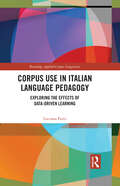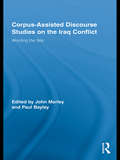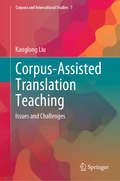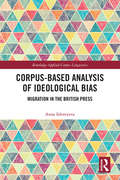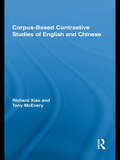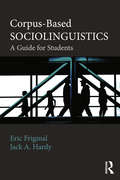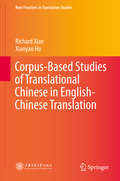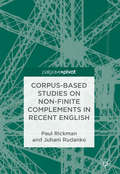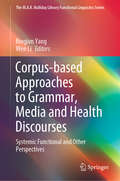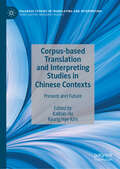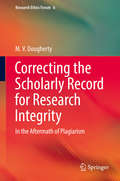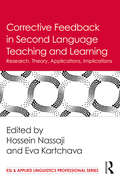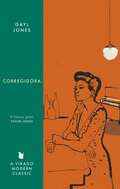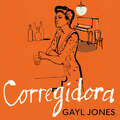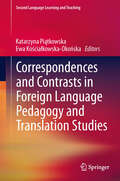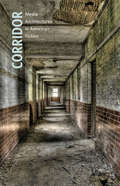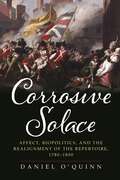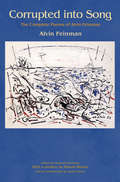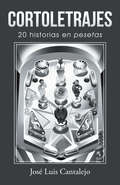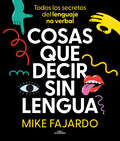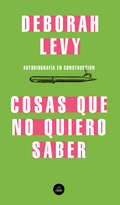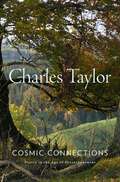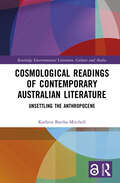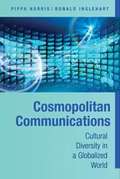- Table View
- List View
Corpus Use in Italian Language Pedagogy: Exploring the Effects of Data-Driven Learning (Routledge Applied Corpus Linguistics)
by Luciana FortiCorpus Use in Italian Language Pedagogy: Exploring the Effects of Data-Driven Learning provides a comprehensive overview of corpus use in Italian L2 Pedagogy. The author addresses Italian language corpus resources, their potential uses in pedagogical settings, and the range of research methods available to evaluate their effectiveness. Overall, the book: provides a comprehensive account of Italian corpora and corpus-based research on Italian that can inform the design, implementation and evaluation of DDL practices in Italian learning and teaching contexts traces the history of DDL, by describing its origins and discussing its theoretical underpinnings, in relation to both linguistics and pedagogy examines the state-of-the-art in DDL research, in light of the available empirical evidence on both etic and emic dimensions, while placing particular emphasis on the methodological gaps illustrates the main methodological challenges in researching DDL, from corpus resource selection to empirical evaluation of its pedagogical effectiveness, and describes how they can be overcome demonstrates, by means of an in-depth case study, how the guidelines provided above can be applied when researching DDL effects in a specific second language learning and teaching context discusses the overall challenges the field faces today, while outlining some desirable avenues for future research and pedagogical practice This book will not only be of interest to those conducting research in corpus linguistics and teaching in the Italian domain, but also to those working with other languages.
Corpus-Assisted Discourse Studies on the Iraq Conflict: Wording the War (Routledge Advances in Corpus Linguistics)
by John Morley Paul BayleyThis volume seeks to illustrate the fundamental role of language in political action, focusing on the war in Iraq. It combines quantitative methods, based on a sophisticated modular corpus that was queried through special software with the aim of identifying regularly occurring lexical and semantic patterns, with classical discourse analysis, which seeks to investigate naturally occurring language in the context in which it is produced. Interpreting the field of politics quite widely, to include news reporting and a quasi-judicial inquiry into the behavior of politicians and journalists, discourses in the USA and the UK are considered. The central purpose of the volume is to gain insights not just into language, and the ways in which we can investigate it through a corpus, but also into the ways in which political action is realized through discourse.
Corpus-Assisted Translation Teaching: Issues and Challenges (Corpora and Intercultural Studies #7)
by Kanglong LiuThis book sheds new light on corpus-assisted translation pedagogy, an intersection of three distinct but cognate disciplines: corpus linguistics, translation and pedagogy. By taking an innovative and empirical approach to translation teaching, the study utilizes mixed methods, including translation experiments, surveys and in-depth focus groups. The results demonstrated the unique advantages and at the same time called attention to possible pitfalls of using corpora for translation teaching purposes. This book enriches our understanding of corpus application in the setting of translation between Chinese and English, two languages which are each distinctly different from one another. Readers will also discover new horizons in this burgeoning and interdisciplinary field of research.This book appeals to a broad readership, from scholars and researchers who are interested in translation technology to widen the scope of translation studies, translation trainers in search of effective teaching approaches to a growing number of cross-disciplinary postgraduate students longing to improve their translation skills and competence.
Corpus-Based Analysis of Ideological Bias: Migration in the British Press (Routledge Applied Corpus Linguistics)
by Anna IslentyevaCorpus-Based Analysis of Ideological Bias presents research combining a range of corpus-linguistic techniques which are employed to analyse how migration discourse is (re)constructed in the contemporary British press. Two specialised corpora containing 1,000 news reports, editorials, and opinion pieces from five major national British newspapers were collected and annotated for this research. The event separating these two corpora is the 2016 referendum on Britain’s membership of the European Union (EU). In its analysis, this book: employs both quantitative and qualitative analytical methods, with four case studies offering a broad perspective on how the topical socio-political issues of migration and asylum seeking are represented by left- and right-wing British newspapers; explores how newspapers reveal their political orientation and promote their political agenda by employing specific linguistic patterns and discursive strategies – in this case, in the representation of the key social actors within migration discourse; provides case studies that place a particular focus on the discourses surrounding European migrants and migration within the EU, which proved to be a very popular topic in the British press both before and after the 2016 EU membership referendum; and offers a comparative corpus analysis that seeks to ascertain whether media discourse regarding EU migration has changed in the wake of the referendum. This book is a useful source not only for students of English, linguistics, and media studies, but also for researchers in the fields of applied corpus linguistics, critical discourse studies, contemporary media analysis, and metaphor research.
Corpus-Based Contrastive Studies of English and Chinese (Routledge Advances in Corpus Linguistics)
by Richard Xiao Tony McEneryThis book is concerned with cross-linguistic contrast of major grammatical categories in English and Chinese, two most important yet genetically different world languages. This genetic difference has resulted in many subsidiary differences that are, among other things, related to grammar. Compared with typologically related languages, cross-linguistic contrast of English and Chinese is more challenging yet promising. The main theme of this book lies in its focus on cross-linguistic contrast of aspect-related grammatical categories, or, grammatical categories that contribute to aspectual meaning – both situation aspect at the semantic level and viewpoint aspect at the grammatical level – in English and Chinese. The unique strength of this volume lies in that it is first corpus-based book contrasting English and Chinese. Given that the state of the art in language studies is to use corpora, the significance of the marriage between contrastive studies and the corpus methodology in this book is not to be underestimated.
Corpus-Based Sociolinguistics: A Guide for Students
by Eric Friginal Jack HardyIn the last decade, the availability of corpora and the technological advancements of corpus tools have increased dramatically. Applied linguists have greater access to data from around the world and in a variety of languages through websites, blogs, and social networking sites, and there is a high level of interest among these scholars in applying corpora and corpus-based methods to other research areas, particularly sociolinguistics. This innovative guidebook presents a systematic, in-depth account of using corpora in sociolinguistics. It introduces and expands the application of corpora and corpus approaches and tools in sociolinguistic research, surveys the growing number of studies in corpus-based sociolinguistics, and provides instructions and options for designing and developing corpus-based studies. Readers will find practical information on such contemporary topics as workplace registers, megacorpora, and using the web as a corpus. Vignettes, case studies, discussion questions, and activities throughout further enhance students’ involvement with the material and provide opportunities for hands-on practice of the methods discussed. Corpus-Based Sociolinguistics is a comprehensive and accessible guide, a must-read for any student or scholar interested in exploring this popular and promising approach to sociolinguistic research.
Corpus-Based Studies of Translational Chinese in English-Chinese Translation (New Frontiers in Translation Studies)
by Richard Xiao Xianyao HuThis book takes a corpus-based approach, which integrates translation studies and contrastive analysis, to the study of translational language. It presents the world's first balanced corpus of translational Chinese, which, in combination with a comparable native Chinese corpus, provides a reliable empirical basis for a comprehensive account of the macro-statistic, lexical, and grammatical features of translational Chinese in English-to-Chinese translation - a significant contribution to Descriptive Translation Studies. The research findings based on these two distinctly different languages have important implications for universal translation research on the European tradition.
Corpus-Based Studies on Non-Finite Complements in Recent English: Corpus-based Studies On Non-finite Complements In Recent English (Palgrave Studies In Language History And Language Change Ser.)
by Juhani Rudanko Paul RickmanThis book showcases fresh research into the underexplored territory of complementation through a detailed analysis of gerunds and ‘to’ infinitives involving control in English. Drawing on large electronic corpora of recent English, it examines subject control in adjectival predicate constructions with ‘scared’, ‘terrified’ and ‘afraid’, moving on to a study of object control with the verbal predicate ‘warn’. In each chapter a case study is presented of a matrix adjective that selects both infinitival and gerundial complements, and a central theme is the application of the Choice Principle as a novel factor bearing on complement selection. The authors argue that it is helpful to view the patterns in question as constructions, as combinations of form and meaning, within the system of English predicate complementation, and convincingly demonstrate how a new gerundial pattern has emerged and spread in the course of the last two centuries. This book will appeal to scholars of semantics, corpus linguistics, and historical linguistics as well as those with an interest in variation and change in recent English more generally.
Corpus-based Approaches to Grammar, Media and Health Discourses: Systemic Functional and Other Perspectives (The M.A.K. Halliday Library Functional Linguistics Series)
by Bingjun Yang Wen LiThis edited volume gathers corpus-based studies on topics including English grammar and discourses on media and health, mainly from a systemic functional linguistics (SFL) perspective, in order to reveal the potential of SFL, which has been emphasized by Halliday. Various other perspectives, such as philosophy, statistics, genre studies, etc. are also included to promote SFL’s potential interaction with other theories. Though they employ a diverse range of theoretical perspectives, all the chapters focus on exploring language in use with the corpus method. The studies collected here are all original, unpublished research articles that address significant questions, deepen readers’ understanding of SFL, and promote its potential interaction with other theories. In addition, they demonstrate the great potential that SFL holds for solving language-related questions in a variety of discourses.
Corpus-based Translation and Interpreting Studies in Chinese Contexts: Present and Future (Palgrave Studies in Translating and Interpreting)
by Kaibao Hu Kyung Hye KimThis edited collection reflects on the development of Chinese corpus-based translation and interpreting studies while emphasising perspectives emerging from a region that has traditionally been given scant consideration in English-language dominated literature. Striking the balance between methodological and theoretical discussion on corpus-based empirical research into Chinese translation and interpreting studies, the chapters additionally introduce and examine a wide variety of case studies. The authors include up-to-date corpus-based research, and place emphasis on new perspectives such as sociology-informed approaches and cognitive translation studies. The book will be of interest to researchers and advanced students of translation/interpreting and contrastive linguistics studies, corpus linguistics, and Chinese linguistics.
Correcting the Scholarly Record for Research Integrity: In the Aftermath of Plagiarism (Research Ethics Forum #6)
by M. V. DoughertyThis volume is the first book-length study on post-publication responses to academic plagiarism in humanities disciplines. It demonstrates that the correction of the scholarly literature for plagiarism is not a task for editors and publishers alone; each member of the research community has an indispensable role in maintaining the integrity of the published literature in the aftermath of plagiarism. If untreated, academic plagiarism damages the integrity of the scholarly record, corrupts the surrounding academic enterprise, and creates inefficiencies across all levels of knowledge production. By providing case studies from the field of philosophy and related disciplines, the volume exhibits that current post-publication responses to academic plagiarism are insufficient. It catalogues how humanities disciplines fall short in comparison with the natural and biomedical sciences for ensuring the integrity of the body of published research. This volume provides clarity about how to conceptualize the scholarly record, surveys the traditional methods for correcting it, and argues for new interventions to improve the reliability of the body of published research. The book is valuable not only to those in the field of philosophy and other humanities disciplines, but also to those interested in research ethics, meta-science, and the sociology of research.
Corrective Feedback in Second Language Teaching and Learning: Research, Theory, Applications, Implications (ESL & Applied Linguistics Professional Series #66)
by Hossein Nassaji Eva KartchavaBringing together current research, analysis, and discussion of the role of corrective feedback in second language teaching and learning, this volume bridges the gap between research and pedagogy by identifying principles of effective feedback strategies and how to use them successfully in classroom instruction. By synthesizing recent works on a range of related themes and topics in this area and integrating them into a single volume, it provides a valuable resource for researchers, graduate students, teachers, and teacher educators in various contexts who seek to enhance their skills and to further their understanding in this key area of second language education.
Corregidora (Virago Modern Classics #785)
by Gayl Jones'No novel about any black woman could ever be the same after this' TONI MORRISON'Corregidora is the most brutally honest and painful revelation of what has occurred, and is occurring, in the souls of Black men and women' JAMES BALDWINUpon publication in 1975, Corregidora was hailed as a masterpiece, winning acclaim from writers including James Baldwin, Maya Angelou, Toni Morrison and John Updike. Exploring themes such as race, sexuality and the long repercussions of slavery, this powerful novel paved the way for Beloved and The Colour Purple. Now, this lost classic is published for a new generation of readers.Blues singer Ursa is consumed by her hatred of Corregidora, the nineteenth-century slave master who fathered both her mother and grandmother. Charged with 'making generations' to bear witness to the abuse embodied in the family name, Ursa Corregidora finds herself unable to keep alive this legacy when she is made sterile in a violent fight with her husband. Haunted by the ghosts of a Brazilian plantation, pained by a present of lovelessness and despair, Ursa slowly and firmly strikes her own terms with womanhood.AS HEARD ON THE BACKLISTED PODCAST'A literary giant, and one of my absolute favourite writers' TAYARI JONES, author of AN AMERICAN MARRIAGEAlso new to the VMC list: Eva's Man and The Healing by Gayl Jones.'An American writer with a powerful sense of vital inheritance, of history in the blood' JOHN UPDIKE'Gayl Jones's first novel, Corregidora (1975), was both shocking and ground-breaking in its probing of the psychological legacy of slavery and sexual ownership through the life of a Kentucky blues singer ... it predated Alice Walker's The Color Purple and Toni Morrison's Beloved, revealing an unfinished emancipation and the power of historical memory to shape lives. It also marked a shift in African-American literature that made women, and relationships between black people, central' MAYA JAGGI, Guardian'Corregidora's survey of trauma and overcoming has become even better and more relevant with the passage of time. It remains an indispensable point of entry into the tradition of African American writing that Gayl Jones reshaped and enriched' PAUL GILROY
Corregidora (Virago Modern Classics #785)
by Gayl Jones'No novel about any black woman could ever be the same after this' TONI MORRISON'Corregidora is the most brutally honest and painful revelation of what has occurred, and is occurring, in the souls of Black men and women' JAMES BALDWINUpon publication in 1975, Corregidora was hailed as a masterpiece, winning acclaim from writers including James Baldwin, Maya Angelou, Toni Morrison and John Updike. Exploring themes such as race, sexuality and the long repercussions of slavery, this powerful novel paved the way for Beloved and The Colour Purple. Now, this lost classic is published for a new generation of readers.Blues singer Ursa is consumed by her hatred of Corregidora, the nineteenth-century slave master who fathered both her mother and grandmother. Charged with 'making generations' to bear witness to the abuse embodied in the family name, Ursa Corregidora finds herself unable to keep alive this legacy when she is made sterile in a violent fight with her husband. Haunted by the ghosts of a Brazilian plantation, pained by a present of lovelessness and despair, Ursa slowly and firmly strikes her own terms with womanhood.AS HEARD ON THE BACKLISTED PODCAST'A literary giant, and one of my absolute favourite writers' TAYARI JONES, author of AN AMERICAN MARRIAGEAlso new to the VMC list: Eva's Man and The Healing by Gayl Jones.'An American writer with a powerful sense of vital inheritance, of history in the blood' JOHN UPDIKE'Gayl Jones's first novel, Corregidora (1975), was both shocking and ground-breaking in its probing of the psychological legacy of slavery and sexual ownership through the life of a Kentucky blues singer ... it predated Alice Walker's The Color Purple and Toni Morrison's Beloved, revealing an unfinished emancipation and the power of historical memory to shape lives. It also marked a shift in African-American literature that made women, and relationships between black people, central' MAYA JAGGI, Guardian'Corregidora's survey of trauma and overcoming has become even better and more relevant with the passage of time. It remains an indispensable point of entry into the tradition of African American writing that Gayl Jones reshaped and enriched' PAUL GILROY
Correspondences and Contrasts in Foreign Language Pedagogy and Translation Studies (Second Language Learning and Teaching)
by Ewa Kościałkowska-Okońska Katarzyna PiątkowskaThe book constitutes a selection of 18 papers on foreign language pedagogy (11 papers) and translation studies (9 papers). The first part of the book is devoted to foreign language pedagogy. The articles in this part focus on issues such as English as lingua franca, foreign language teacher training, the role of individual learner differences in language learning and teaching especially with respect to strategies of language learning as well as psychological and socioaffective factors. The part focusing on translation studies comprises articles devoted to a variety of topics. It places a wide range of readings within the context of varying translation domains such as translation competence, literary translation, translation strategies, translation teaching (including strategies of dictionary use) and translator training. The combination of the above aspects intends to underline the truly interdisciplinary nature of translation.
Corridor: Media Architectures in American Fiction
by Kate MarshallCorridor offers a series of conceptually provocative readings that illuminate a hidden and surprising relationship between architectural space and modern American fiction. By paying close attention to fictional descriptions of some of modernity&’s least remarkable structures, such as plumbing, ductwork, and airshafts, Kate Marshall discovers a rich network of connections between corridors and novels, one that also sheds new light on the nature of modern media.The corridor is the dominant organizational structure in modern architecture, yet its various functions are taken for granted, and it tends to disappear from view. But, as Marshall shows, even the most banal structures become strangely visible in the noisy communication systems of American fiction. By examining the link between modernist novels and corridors, Marshall demonstrates the ways architectural elements act as media. In a fresh look at the late naturalist fiction of the 1920s, &’30s, and &’40s, she leads the reader through the fetus-clogged sewers of Manhattan Transfer to the corpse-choked furnaces of Native Son and reveals how these invisible spaces have a fascinating history in organizing the structure of modern persons. Portraying media as not only objects but processes, Marshall develops a new idiom for Americanist literary criticism, one that explains how media studies can inform our understanding of modernist literature.
Corrosive Solace: Affect, Biopolitics, and the Realignment of the Repertoire, 1780-1800
by Daniel O'QuinnIn Corrosive Solace, Daniel O’Quinn argues that the loss of the American colonies instantiated a complex reorganization in sociability and politics in the British metropole that has had long-lasting effects on British national and imperial culture, which can be seen and analyzed within its performative repertoire. He examines how the analysis of feeling or affect can be deployed to address the inchoate causal relation between historical events and their mediation. In this sense, Corrosive Solace’s goals are twofold: first, to outline the methodologies necessary for dealing with the affective recognition of historical crisis; and second, to make the historically familiar strange again, and thus make visible key avenues for discussion that have remained dormant. Both of these objectives turn on recognition: How do we theorize the implicit affective recognition of crisis in a distant historical moment? And how do we recognize what we, in our present moment, cannot discern?Corrosive Solace addresses this complex cultural reorientation by attending less to “new” cultural products than to the theoretical and historical problems posed by looking at the transformation of “old” plays and modes of performance. These “old” plays—Shakespeare, post-Restoration comedy and she-tragedy—were a vital plank of the cultural patrimony, so much of O’Quinn’s analysis lies in how tradition was recovered and redirected to meet urgent social and political needs. Across the arc of Corrosive Solace, he tracks how the loss of the American War forced Britons to refashion the repertoire of cultural signs and social dispositions that had subtended its first empire in the Atlantic world in a way more suited to its emergent empire in South Asia.
Corrupted into Song: The Complete Poems of Alvin Feinman
by Harold Bloom James Geary Alvin Feinman Deborah DorfmanAccording to Harold Bloom, "The best of Alvin Feinman's poetry is as good as anything by a twentieth-century American. His work achieves the greatness of the American sublime." Yet, in part because he published so sparsely, Feinman remained little-read and largely unknown when he died in 2008. This definitive edition of Feinman's complete work, which includes fifty-seven previously published poems and thirty-nine unpublished poems discovered among his manuscripts, introduces a new generation of readers to the lyrical intensity and philosophical ambition of this major American poet. Harold Bloom, a lifelong friend of Feinman, provides a preface in which he examines Feinman's work in the context of the strongest poets of his generation--John Ashbery, James Merrill, and A. R. Ammons--while the introduction by James Geary, who studied with Feinman at Bennington College, presents a biographical and critical sketch of this remarkable poet and teacher. Corrupted into Song restores Feinman's work to its rightful place alongside that of poets like Hart Crane and Wallace Stevens, with whom his poetry and poetics have so much in common.
Cortoletrajes: 20 historias en pesetas
by José Luis Cantalejo«20 historias cortas que te harán reír, llorar y disfrutar volviendo a los tiempos en los que todavía vivíamos "en pesetas".» <P><P>Cortoletrajes reúne veinte relatos, diez de ellos premiados en diferentes concursos literarios. Veinte historias escritas en los años 80 y 90, cuando pagábamos en pesetas y existían los carretes de fotos, las cabinas telefónicas, las máquinas de escribir... <P>Aunque muy diferentes entre sí, los relatos cuentan con un estilo propio en el que la tensión narrativa sumerge al lector en las historias para que viva, junto a los protagonistas, sus éxitos y sus fracasos. La locura, el amor, la traición, el paso del tiempo todo ello está presente en Cortoletrajes. También la ironía, la magia, los toques surrealistas... <P>Veinte relatos en los que nada es lo que parece y en los que la sorpresa final está garantizada.
Cosas que decir sin lengua: Todos los secretos del lenguaje no verbal
by Mike FajardoMike Fajardo te enseña un montón de curiosidades y trucos sobre la comunicación no verbal para que aprendas a interpretar qué dice la gente cuando no abre la boca. ¿Sabes detectar si una persona está mintiendo? ¿Qué significa que alguien te frunza el ceño? ¿Crees que puedes saber si eres bienvenido en un lugar por la posición de los pies de las personas que te reciben? Y, sobre todo, ¿hay manera de saber, sin preguntarlo, si a esa persona que tanto te gusta también le gustas tú?A partir de ahora, los gestos y los guiños ya no tendrán secretos para ti. En estas páginas encontrarás explicaciones sencillas a por qué cruzamos las piernas en una conversación, los trucos para hablar en público, las técnicas para adelantarnos a los movimientos de los demás y, por supuesto, las claves básicas para interpretar si le gustamos a esa persona.
Cosas que no quiero saber
by Deborah LevyPrimera parte de la «autobiografía en construcción» de Deborah Levy, un relato de la feminidad como libertad y no como castigo. Deborah Levy arranca estas memorias recordando la etapa de su vida en que rompía a llorar cuando subía unas escaleras mecánicas. Ese movimiento inocuo la llevaba a rincones de su memoria a los que no quería volver. Son esos recuerdos los que forman Cosas que no quiero saber, el inicio de su «autobiografía en construcción». Esta primera parte de lo que será un tríptico sobre la condición de ser mujer nace como respuesta al ensayo «Por qué escribo», de George Orwell. Sin embargo, Levy no viene a dar respuestas. Viene a abrir interrogantes que deja flotando en una atmósfera formada por toda la fuerza poética de su escritura. Su magia no es otra que la de las conexiones impredecibles de la memoria: el primer mordisco a un albaricoque la traslada a la salida de sus hijos de la escuela, observando a las otras madres, «jóvenes convertidas en sombras de lo que habían sido»; el llanto de una mujer le devuelve la nieve cayendo sobre su padre en el Johannesburgo del apartheid, poco antes de ser encarcelado; el olor del curry la lleva a su adolescencia en Londres, escribiendo en servilletas de bares y soñando con una habitación propia. Leer a Levy es querer entrar en sus recuerdos y dejarse llevar por la calma y el aplomo de quien ha aprendido todo lo que sabe (y todo lo que no querría saber) a fuerza de buscar su propia voz. Reseñas:«Imprescindible. Leerla es como encontrar un oasis.»The Guardian «El punto fuerte de Levy es su originalidad de pensamiento y expresión.»Jeanette Winterson «Una narración vivaz y brillante sobre cómo los detalles más inocentes de la vida personal de una escritora pueden alcanzar el poder en la ficción.»The New York Times Book Review «Un relato vívido y sorprendente de la vida de la escritora, que feminiza y personaliza las contundentes a afirmaciones de Orwell.»The Spectator «Levy es una escritora hábil y crea un despliegue de emociones intensas en una prosa precisa y controlada.»The Independent «Una versión actualizada de Una habitación propia [...]. Sospecho que será citado durante muchos años.»The Irish Examiner
Cosmic Connections: Poetry in the Age of Disenchantment
by Charles TaylorA major new work by Charles Taylor: the long-awaited follow-up to The Language Animal, exploring the Romantic poetics central to his theory of language.The Language Animal, Charles Taylor’s 2016 account of human linguistic capacity, was a revelation, toppling scholarly conventions and illuminating our most fundamental selves. But, as Taylor noted in that work, there was much more to be said. Cosmic Connections continues Taylor’s exploration of Romantic and post-Romantic responses to disenchantment and innovations in language.Reacting to the fall of cosmic orders that were at once metaphysical and moral, the Romantics used the symbols and music of poetry to recover contact with reality beyond fragmented existence. They sought to overcome disenchantment and groped toward a new meaning of life. Their accomplishments have been extended by post-Romantic generations into the present day. Taylor’s magisterial work takes us from Hölderlin, Novalis, Keats, and Shelley to Hopkins, Rilke, Baudelaire, and Mallarmé, and on to Eliot, Miłosz, and beyond.In seeking deeper understanding and a different orientation to life, the language of poetry is not merely a pleasurable presentation of doctrines already elaborated elsewhere. Rather, Taylor insists, poetry persuades us through the experience of connection. The resulting conviction is very different from that gained through the force of argument. By its very nature, poetry’s reasoning will often be incomplete, tentative, and enigmatic. But at the same time, its insight is too moving—too obviously true—to be ignored.
Cosmological Readings of Contemporary Australian Literature: Unsettling the Anthropocene (Routledge Environmental Literature, Culture and Media)
by Kathrin Bartha-MitchellThis book presents an innovative and imaginative reading of contemporary Australian literature in the context of unprecedented ecological crisis. The Australian continent has seen significant, rapid changes to its cultures and land-use from the impact of British colonial rule, yet there is a rich history of Indigenous land-ethics and cosmological thought. By using the age-old idea of ‘cosmos’—the order of the world—to foreground ideas of a good order and chaos, reciprocity and more-than-human agency, this book interrogates the Anthropocene in Australia, focusing on notions of colonisation, farming, mining, bioethics, technology, environmental justice and sovereignty. It offers ‘cosmological readings’ of a diverse range of authors—Indigenous and non-Indigenous—as a challenge to the Anthropocene’s decline-narrative. As a result, it reactivates ‘cosmos’ as an ethical vision and a transculturally important counter-concept to the Anthropocene. Kathrin Bartha-Mitchell argues that the arts can help us envision radical cosmologies of being in and with the planet, and to address the very real social and environmental problems of our era. This book will be of particular interest to scholars and students of Ecocriticism, Environmental Humanities, and postcolonial, transcultural and Indigenous studies, with a primary focus on Australian, New Zealand, Oceanic and Pacific area studies.
Cosmology and the Polis
by Richard SeafordThis book further develops Professor Seaford's innovative work on the study of ritual and money in the developing Greek polis. It employs the concept of the chronotope, which refers to the phenomenon whereby the spatial and temporal frameworks explicit or implicit in a text have the same structure, and uncovers various such chronotopes in Homer, the Homeric Hymn to Demeter, Presocratic philosophy and in particular the tragedies of Aeschylus. Mikhail Bakhtin's pioneering use of the chronotope was in literary analysis. This study by contrast derives the variety of chronotopes manifest in Greek texts from the variety of socially integrative practices in the developing polis - notably reciprocity, collective ritual and monetised exchange. In particular, the Oresteia of Aeschylus embody the reassuring absorption of the new and threatening monetised chronotope into the traditional chronotope that arises from collective ritual with its aetiological myth. This argument includes the first ever demonstration of the profound affinities between Aeschylus and the (Presocratic) philosophy of his time.
Cosmopolitan Communications: Cultural Diversity in a Globalized World
by Pippa Norris Ronald InglehartSocieties around the world have experienced a flood of information from diverse channels originating beyond local communities and even national borders, transmitted through the rapid expansion of cosmopolitan communications. For more than half a century, conventional interpretations, Norris and Inglehart argue, have commonly exaggerated the potential threats arising from this process. A series of fire-walls protect national cultures. This book develops a new theoretical framework for understanding cosmopolitan communications and uses it to identify the conditions under which global communications are most likely to endanger cultural diversity. The authors analyze empirical evidence from both the societal level and the individual level, examining the outlook and beliefs of people in a wide range of societies. The study draws on evidence from the World Values Survey, covering 90 societies in all major regions worldwide from 1981 to 2007. The conclusion considers the implications of their findings for cultural policies.
